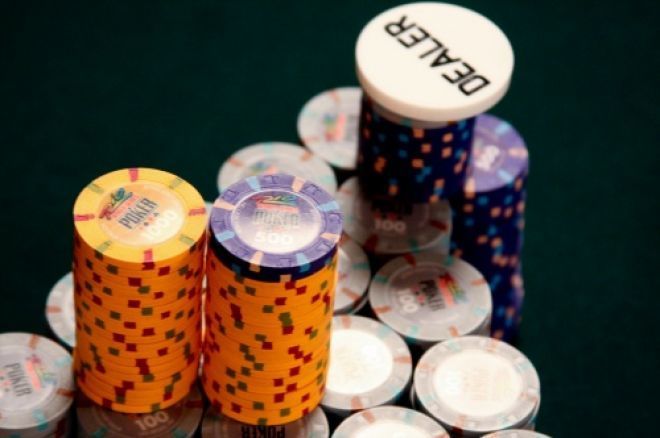

If you watch a large number of poker on television, you've probably noticed how most no-limit hold'em hands are contested heads-up after the flop. A player opens with a raise, another calls, then it's just the 2 of them battling for the pot thereafter.
The same is correct for those who rail online poker games involving better poker players, corresponding to the large weekly tournaments and Sunday majors. Unlike perhaps is the case in lots of home games and likewise lower-limit live games, there's often going to be just two players left by the point the community cards arrive.
In heads-up situations, it's obvious enough to show that one player could be "in position" postflop and get to behave last on all streets while the opposite can be "out of position" and feature to behave first. For those who weren't paying attention, chances are you'll assume players spend about half their hands playing from out of position and half playing in position — but that might be wrong.
The truth is, most good players play nearly all of their hands in position — by a lot, in reality. That's because with regards to starting hand selection, good players are likely to fold more hands after they could be forced to play from out of position and to get entangled more frequently once they may have position. They achieve this because they know there are lots of advantages to having position on an opponent after the flop.
Position in poker
The seats around a no-limit hold'em table tend to be described as being either early position, middle position, or late position, with the site of the button and blinds determining each.
"Early position" (EP) usually refers back to the players having to post both the small blind (SB) and massive blind (BB), in addition to the player sitting to the large blind's left within the position referred to as "under the gun" or "UTG." At a nine- or ten-handed table, the following seat (UTG+1) may also be considered early position, for the reason that a number of the table is in later positions, relatively speaking.
Note incidentally that even if the SB and BB act last preflop — after the UTG player and everybody else around to the button — those are considered early position seats since they'll be acting first every betting round after the flop.
"Middle position" (MP) usually refers back to the next couple or three seats on the table, leading as much as the last two or three seats culminating with the button.
That leaves "late position" (LP) seats that come with the button (the newest position), the cutoff (the seat to the precise of the button), and the hijack seat (the seat to the proper of the cutoff). Of course, in short-handed games (e.g., 6-max.) the hijack would probably be better designated middle position.
As noted, the most productive no-limit hold'em players generally decide to play most in their hands from late position, fewer from middle position, and least from early position. Not coincidentally, in addition they win most in their money playing from later position, with even the most productive hold'em players tending to be net losers when playing from early position.
Here's a handy guide a rough list of 5 the explanation why playing in position is preferable in no-limit hold'em:
1. More free cards
There are times when playing drawing hands when you'd rather not pay a worth to get to the following postflop street. If in case you have position to your opponent, you've got the chance to take a "free card" in case your opponent checks to you if you are on a draw, checking behind to peer the following community card.
Say you made a decision to play suited connectors and feature ![]()
![]() on a
on a ![]()
![]()
![]() flop. Your opponent who has to behave first decides to test. You must bet, but you too can check behind and take a "free card" to peer in case you can complete your flush. When you were first to act, though, you don't have any assurance whilst you check that your opponent won't bet and make you pay to stay around within the hand.
flop. Your opponent who has to behave first decides to test. You must bet, but you too can check behind and take a "free card" to peer in case you can complete your flush. When you were first to act, though, you don't have any assurance whilst you check that your opponent won't bet and make you pay to stay around within the hand.
2. Pot control
Acting last on every postflop street usually helps you control how big or small of a pot you find yourself playing. If you want to play a small pot and an opponent checks, you'll be able to check behind, and in case your opponent bets you'll be able to just call and shut the action. If you wish to play a larger pot, you'll bet or raise when the action is on you.
When out of position, you can not check and be certain your opponent will check and allow you to see the following card without spending a dime. Nor are you able to bet and ensure that your opponent will fold or only call you (thus keeping the pot small).
3. More bluffing opportunities
Having position on an opponent is so valuable, it could actually often make up for having a comparatively weak hand. In other words, your literal hand strength could also be weak, but by attending to act last you might have much more leverage when seeking to represent stronger hands. That translates into more chances to bluff when your opponent who's out of position demonstrates weakness by checking to you.
You raise from the button and get called by the massive blind, the flop comes ![]()
![]()
![]() , and your opponent checks. Should you bet and your opponent doesn't have an ace or king (or even a six), you will likely earn a fold, thereby making your actual hand strength somewhat irrelevant. You might have
, and your opponent checks. Should you bet and your opponent doesn't have an ace or king (or even a six), you will likely earn a fold, thereby making your actual hand strength somewhat irrelevant. You might have ![]()
![]() ,
, ![]()
![]() , or
, or ![]()
![]() , it's not relevant — position won you the hand, not the cards.
, it's not relevant — position won you the hand, not the cards.
4. Calculating pot odds
Say you might be in a four-way hand holding ![]()
![]() , the flop comes
, the flop comes ![]()
![]()
![]() , and also you are second to behave. There may be 1,500 within the middle and the primary player leads with a big gamble of 500. Together with your open-ended straight draw you would like to name and spot the turn. In the event you were last to act, you'd know for certain what your immediate pot odds were — you're looking to win 2,000 and want only call 500, so your pot odds are 4-to-1. (See "10 Hold'em Tips: Pot Odds Basics.")
, and also you are second to behave. There may be 1,500 within the middle and the primary player leads with a big gamble of 500. Together with your open-ended straight draw you would like to name and spot the turn. In the event you were last to act, you'd know for certain what your immediate pot odds were — you're looking to win 2,000 and want only call 500, so your pot odds are 4-to-1. (See "10 Hold'em Tips: Pot Odds Basics.")
But with players still to behave behind you, you cannot make this calculation. You do not know if the opposite two players will just call also (making your pot odds even better), or if one might raise and force you to pay much more to stay around (making your pot odds potentially much worse). In case you were in position and acting last, though, you'll want to know precisely what your pot odds were going forward.
5. Knowing your opponent's action
This is the largest advantage to having position (and admittedly covers the entire advantages listed above) — namely, with the ability to know the way your opponent goes to play a given postflop street before it's a must to make your decision easy methods to play it. You're more informed knowing that while your opponent can always be seeking to deceive you, a check usually means they aren't so enthused by the board while a chance indicates interest.
When playing from position, a large number of strong players use an opponent's action as a chief factor when deciding the way to play each street.
Conclusion
The mere incontrovertible fact that the button moves each hand to make sure everyone on the table gets an equal opportunity to play from the entire available positions should let you know that position matters in poker. If it didn't, there'd be no use to spread the positional wealth evenly on this way.
Playing from out of position can occasionally have advantages, too. From out of position you'll check-raise, which as we've covered before on this series could be a powerful postflop play. Also, sometimes acting first lets you prevent other players from acting, say in a multi-way pot where an early position bet or raise might force others out of a hand.
However, the benefits of playing in position are much greater. It is a big for the reason that the seating arrangement at a table can also be so important — that is, it's significantly better to not have strong, difficult players in your left and in position on you for many hands than to have them sitting for your right where you get to have position on them a number of the time.
Position is likely one of the most significant factors affecting no-limit hold'em strategy. Fiddling with position in your opponents both reduces your risk and increases your chance at rewards. Help your personal cause by playing more hands in position, and check out to not help your opponents and play fewer from out of position.
Also on this series...
Ready to sit on the table? Put these hold'em tips into practice at partypoker.
Want to stick atop the entire latest within the poker world? If so, you'll want to get PokerNews updates for your social media outlets. Follow us on Twitter and find us on both Facebook and Google+!
PokerNews.com is the world's leading poker website. Among other things, visitors will discover a daily dose of articles with the newest poker news, live reporting from tournaments, exclusive videos, podcasts and such a lot more.
PokerStars is the biggest online poker room offering the largest amount of poker games and different game variations including Texas Hold'em, Omaha and other popular poker games. By joining PokerStars you'll be able to easily learn the entire poker rules and poker strategy by playing free poker games. Join PokerStars and luxuriate in high quality online poker.

Read More... [Source: PokerNews]
No comments:
Post a Comment